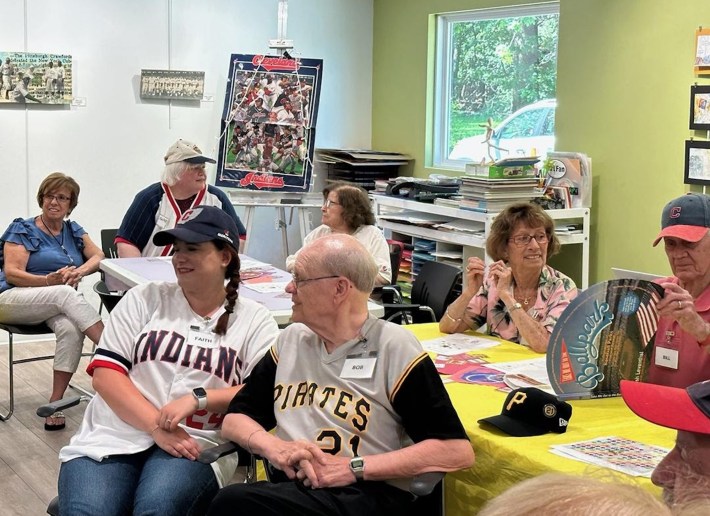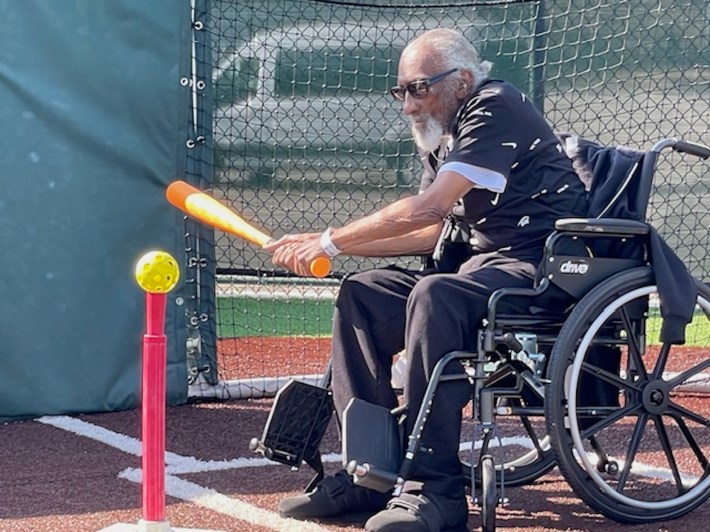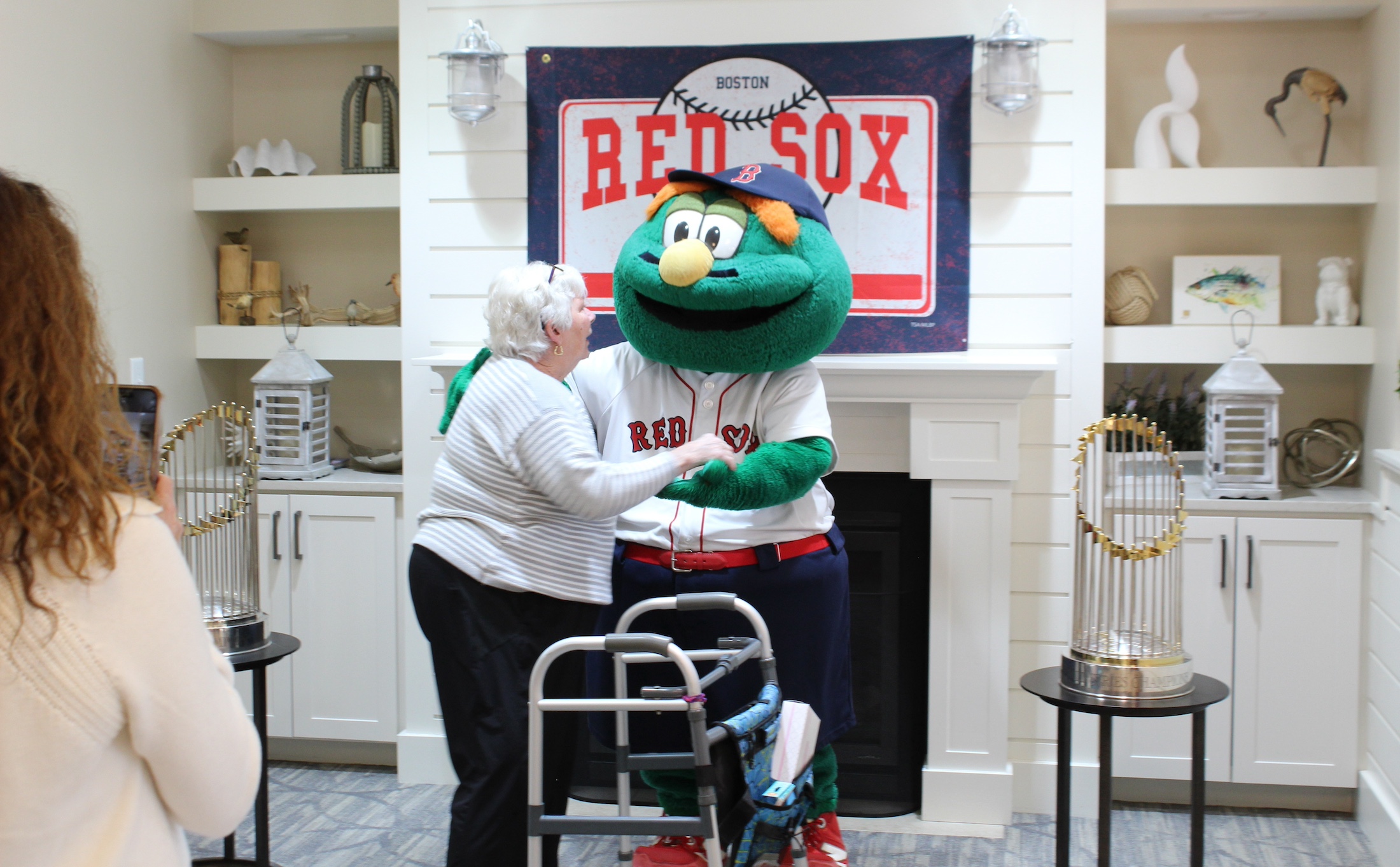On a breezy Monday in March—the type of day that passes for early-season baseball weather in Northern Ohio—a couple dozen fans gathered in the Cleveland suburb of Westlake. Not at a field, but at the Center for Artful Living, home of the Carolyn L. Farrell Foundation, an organization founded 13 years ago to enrich the lives of dementia patients and their families through the arts.
Carolyn Farrell was diagnosed with dementia a week after her husband Charlie retired as a vascular surgeon, and he served as her caregiver until her death in 2015. “I had the opportunity to care for her,” he says pointedly.
Ike Brooks, a longtime member of the Society for American Baseball Research (SABR), is leading the program. Charlie himself is not a big baseball fan, but he’s now living with dementia himself, and appreciates even more the value of afternoons like this one.
The presentation is structured like a baseball game. It begins with the introduction of starting lineups, so to speak, as the patients and caregivers introduce themselves. Since it’s shortly before the start of the baseball season, Brooks talks about Opening Days in local baseball history, including Bob Feller’s Opening Day no-hitter in 1940, the Opening Day in 1948 when Cleveland last won the World Series (another Feller win, a 4-0 shutout of the St. Louis Browns), Frank Robinson’s debut as the first African-American manager in 1975 (a player-coach, Robinson homered), the first opener at what was then Jacobs Field in 1994, and the game that’s referred to as “Snowpening Day,” when the Indians couldn’t finish the 2007 opener due to flurries (and maybe a little gamesmanship by Mariners manager Mike Hargrove).
There’s a seventh-inning stretch, when everyone gets up and sings “Take Me Out To the Ballgame.” There are pretzels and popcorn. Everyone goes home feeling a little warmer than they did when they walked in.

In his Hustler’s Handbook, Bill Veeck talked about the fundamental challenge of the business of baseball. “Although you are dependent on repeat business, you have NO PRODUCT to sell,” he wrote. “The customer comes out to the park with nothing except the illusion that he’s going to have a good time. He leaves with nothing but a memory.”
And in towns like Westlake, at centers like the Farrell Foundation, SABR members use their love of baseball to connect with fans in various stages of dementia, hoping to bring forth those warm memories again in the throes of an irreversible condition. The organization and the Alzheimer’s Association announced a formal partnership during spring training to continue and advance that work.
“We don’t do statistics,” says Jerry Devis, executive director of the Farrell Foundation. “We try to get into feelings, the senses of baseball.
“It’s an opportunity for socialization, which is important for the patient and caregiver. People with dementia are reluctant to engage in the community, and isolation itself is a disease.”
Turns out that remembering some guys is good for you.
Dementia is a catch-all term for cognitive impairment that can affect memory or other thinking skills. Alzheimer’s, named for the German doctor who first noted in a deceased patient's brain the plaque and tangles that remain the hallmarks of the disease more than a century later, is a form of dementia. And although there is some age-related decline in cognitive function, the Alzheimer’s Association notes that neither Alzheimer’s nor dementia are part of the normal aging process. They are, however, on the rise.
It’s estimated that more than 6.9 million Americans are living with Alzheimer’s disease. This year, the last of the Baby Boomers will turn 60, the age after which Alzheimer’s disease typically appears. By 2060, barring any kind of clinical breakthrough, it’s estimated that more than 14 million Americans could have Alzheimer’s. The disease is incurable and fatal, within four to eight years in most cases.
There are drugs to treat symptoms of Alzheimer’s, even slowing their advance. But dementia in general brings forth a host of quality-of-life issues. Can patients continue living at home? Do they require nursing care? (This being America, as the number of people with Alzheimer’s increases, so too does the cost of treating them, which could rise above $500 billion by 2040.)
There are various forms of therapy that can improve quality of life, says Sam Fazio, the senior director of quality care and psychosocial research at the Alzheimer's Association. “Non-pharmacological intervention should be our first line of approach,” he says. “What can we do to change the environment to make this experience better for the person with the disease?”

There’s light-centered therapy or music therapy. Farrell, the retired vascular surgeon, specifically mentioned art therapy, which becomes ideal for some patients who might become more reluctant to talk as the disease progresses. (As dementia progresses, speech can become impaired and some patients do become nonverbal.)
But there’s also something called reminiscence therapy. The idea is that by recalling past events, usually those associated with happy times, dementia patients can be more cheerful and sociable. The phrase used a lot is “come out of their shells.”
The events recalled can be moments of their own lives, often in college, as newlyweds, or as young parents. Or they can be recollections of elements of their sports fandom. And the Baby Boomers might be the last generation for which the pre-eminent spectator sport of its members' youth was baseball.
Following legendary basketball coach Bob Knight’s death, author Luke Epplin recalled on Twitter a conversation that he had first with Knight, himself a Northeast Ohio native, and then one of his friends. Epplin mailed Knight a copy of Our Team, his book on the 1948 Cleveland Indians, and Knight called Epplin, which the author called a strange experience as Knight seemed forgetful and fractious. Shortly afterward, a friend of Knight’s contacted Epplin and said that the coach was suffering from Alzheimer’s but, having the book read to him, could remember the players and games described in it. Knight’s friend said that “the book had given comfort not only to Bobby Knight but to him, to recover, if only momentarily, the conversation with the friend he'd known for decades.”
In 2009, a program in Scotland launched, encouraging fans to share their soccer memories. Two years later, the first baseball version appeared in the States. In 2018, SABR member Jon Leonoudakis initiated a similar program in Los Angeles, after hearing from a friend in Texas who had started one. Leonoudakis said he found success with it in memory care units, as well as with veterans in VA hospitals, who might also be reticent for different reasons.
At its heart, SABR is an organization of people who love baseball and love researching it and talking about it. (I myself am a member, because reading old newspapers is my idea of a good time. At least two stories I’ve done for this site came about in part because I was a SABR member.) And that’s what led Leonoudakis to start taking this project to dementia patients.
“Reminiscence therapy is a real thing, but we’re not licensed therapists,” says Leonoudakis, a member of SABR's leadership advisory team and session facilitator. “Our expertise is in baseball history, baseball stories and leading these sessions to bring these people to a place where they can meet other people who are having this experience and build relationships.”
Fazio says programs like Baseball Memories can also make connections between patients and caregivers, often the patient’s spouse. It might seem like they wouldn’t need to connect, but such is the nature of dementia. And it can be a learning experience for the caregivers as well.
“I never knew what a 'can of corn' was,” says Jan Fitzpatrick, who brought her husband Rob to the Farrell Foundation.
Rob grew up in the Pittsburgh area, taking the trolley to Forbes Field and falling in love with the Pirates teams of Bill Mazeroski and Roberto Clemente; he still has a collection of Clemente cards at home. He was formally diagnosed in 2017, and although he hasn’t been to a ballgame in a few years, he still looks for opportunities to share his fandom.
“It’s therapeutic in the sense that it brings joy,” Jan says. “This has been a wonderful program.”
Rob Fitzpatrick wore his Pirates hat to this event, and the gathering featured a lot of people wearing gear from their favorite teams. Fans like to get dressed up for baseball gatherings, Leonoudakis says, even if getting patients dressed and out the door can be one of the most challenging aspects of caregiving.
Ironically, another terrible disease gave Baseball Memories a boost. When COVID-19 hit, the program went virtual, making attendance easier for a lot of patients and caregivers. Attendance skyrocketed.
“In one of the virtual sessions, we had an 85-year-old woman talking from her backyard,” Leonoudakis says. “She talked about how her father played minor league baseball and she loved the game. Her daughter reached out the next day and said she rarely speaks. To see her that engaged was wonderful. That’s at the core of what we do.”
Leonoudakis says that even people who weren’t baseball fans into adulthood still retain a link to the game. “People remembered playing ball in the street. Or they’d say, ‘My dad would take me to the game.’ Or their mother loved the game, and they’d listen to the games together on the radio. Everyone had some connection.”
Little by little, the idea spread to other chapters, and a formal Baseball Memories committee was formed. In some instances, MLB teams started to get involved directly; they’ll provide gear or tickets or send a player or former player to speak at an event.
And now, with a partnership with the Alzheimer’s Association, there’s hope that the program can grow even further, and help briefly brighten the lives of those suffering from a particularly cruel disease.
“These people will go home and talk about what a great time they had,” Leonoudakis says. “There’s a real afterglow. It isn’t something that lasts for days. It’s something that lasts for hours. But it’s worth its weight in gold.”






